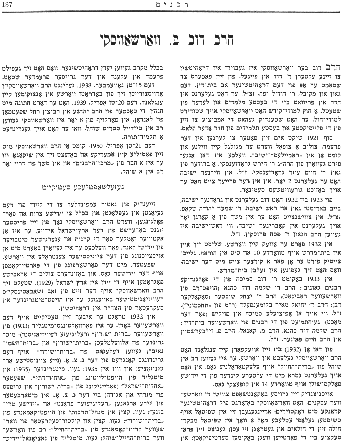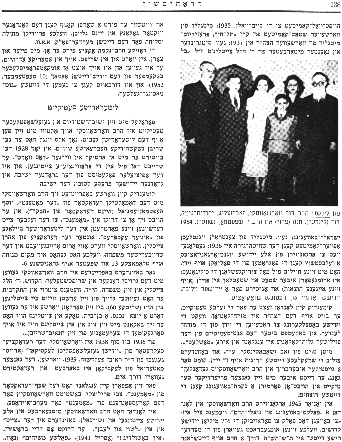Previous Page
|
Next Page

[
Page 137
]
RABBI DOV B. WARSHAVSKY
Rabbi Dov Ber Warshavsky was born in Drohitchin to his parents, R. David and
Feigel Warshavsky. On his father's side, he was a descendant of the Drohitchin
rabbinical judge and kabbalist, R. Dovidel Yaffe. He studied in
kheder
under the best teachers in town. In addition to Torah subjects, Warshavsky
also studied secular subjects. He always had the ambition to be the most
diligent and best students in class.
At the end of 1921, his father
sent him to study out of town. For certain reasons he ended up in the Rameiles
Yeshiva in Vilna, which was headed by Rabbi Hirsh Grodzensky, a brother of the
great scholar, Rabbi Chaim Ozer Grodzensky. Rabbi Warshavsky spent two years in
the Vilna yeshiva, and early on spent time at Gurevitch's seminary.
From 1923 to 1932, Dov studied
in the Grodno yeshiva under the esteemed Rabbi and Yeshiva Head, Shimon Yehuda
Shkop. During this time he spent a year in the Kobrin yeshiva, where Rabbi
Pesach Pruskin headed the Yeshiva. In 1932 he traveled to Warsaw, where he
became involved in teaching while briefly running the yeshiva located in the
House of Study at 10 Tvarda Street.
In 1933 the following great
rabbis ordained R. Dov: Rabbi Shlomo David Kahane (chief rabbi of the Warsaw
rabbinate), Rabbi Yitzchak Shuster (Sokolov Rabbi) and Rabbi Yechiel Meir
Blumenfeld (head of the middle level school,
Techakmoni)
. He also received official government-sponsored Polish-language ordination
signed by the rabbis of the Warsaw Rabbinical Court: Rabbis Shlomo David
Kahane, M. Kanal, P. Zilberstein and Chaim Posner.
From then on (1932), until he
left for England, Rabbi Warshavsky lived in Warsaw. He was the rabbi at the
Brit Hachayal
Synagogue on Elektoralnaya Street; he taught Talmud to older children from the
Jewish Folkschule at 14 Tvarda Street and Kupetsky Street.
Since he was very familiar with
Warsaw businessmen, Warshavsky was able to provide doctors for many ill
Drohitchin patients, and free hospital services. Several times a week, Rabbi
Warshavsky went to the hospital to visit the sick and bring them food. He also
used his connections with political parties to obtain emigration certificates
to Palestine, and was available to assist anyone from Drohitchin who felt alien
and alone in the big city.
On November 15, 1938, he was
able to leave Poland and get to England. On April 20, 1939, he married Chana,
the daughter of Rabbi Yehoshua and Mrs. Rachel Shpetman of London. During the
next 8 years, Rabbi Warshavsky was the rabbi of the Teasdale Street Synagogue,
where he founded a religious school [Talmud Torah].
On April 21, 1950, Rabbi
Warshavsky arrived in the United States with his family and settled in Chicago,
where he was a member of the Rabbinical Center; he also served as a
congregational rabbi for three years.
Community Activities
It was Rabbi Warshavsky's nature to empathize with Jews experiencing suffering
and persecution. From his early youth, he was committed to Zionism. He was an
active fundraiser and an energetic participant in building Israel, for which
the Zionist Central Office in Warsaw gave him an award.
Later on, as political party disputes grew sharper in the Jewish community, and
after the Arab pogroms against Jews in 1929 in Palestine, Rabbi Warshavsky
offered his support to Vladimir Jabotinsky's Revisionist movement, and was a
senior co-founder and secretary of the Revisionists in Drohitchin.
In 1932, Rabbi Warshavsky expanded his work to Warsaw, and in 1933 he was:
a member of the administrative committee of the Warsaw religious Revisionist
group,
Brit Yeshurun
; a co-founder of the international
Brit Yeshurun [Covenant of Israel]
and
Brit Hashmona'im [Covenant of the Maccabees]
movement; a delegate of
Brit Yeshurun
at the establishment of the New Zionist Organization in Vienna in 1935; a
former co-founder (1935) and a director of the
Religious Association
, later known as
Jewish Unity
(which was the merger of
Brit Yeshurun
and groups of Mizrachi and Agudath Israel members) in the New Zionist
Organization; a participant in its journals,
Religious Front
and
Jewish Tribune;
the former leader and cultural secretary of the Warsaw region command of
Brit Hachayal [Covenant of the Soldier];
rabbi of the Warsaw
Brit Hachayal
synagogue;

[
Page 138
]
[photo:] From left, Rabbi Dov Warshavsky, Ze'ev-Zelig, Yehudit-Gittel, David
(children), Chana (wife) and Rabbi Y. Shpetman (father-in-law), 1954.
former member of National Jewish Election Committee to the Polish Parliament,
1935; member of the Warsaw Tel-Chai Fund Committee; member of steering
committee of the New Zionist Organization in 1937 in Warsaw; former co-founder
and close colleague of R. Hillel Zeitlin's
Kol Yisrael [All Israel]
movement; former member of the Central Youth Committee to Protect Jewish
Ritual Slaughter in Poland in 1936; he had planned to organize all Jewish youth
organizations into a single self-defense unit to protect the Jews from pogroms
by the Poles; together with his soldiers he was able to strike back at the
gangs. He traveled throughout Poland (at his own expense) to speak on behalf of
a Jewish State, a Jewish army and a rescue evacuation plan.
When he arrived in England, he
resumed the same activities. He built the Revisionist Zionist organization in
East London, and roused the Jews to save the Jews of Eastern Europe. He also
bitterly fought the anti-semitism of the Polish émigré community
and its
moshkas
in England. When Ze'ev (Vladimir) Jabotinsky died, and especially after the
horrible German murder of Jews, Rabbi Warshavsky underwent an intellectual
transformation. He ceased his former activities and devoted himself singularly
to create a vengeance organization against the German murderers.
In January, 1945 in London,
Rabbi Warshavsky organized the
People's Blood Redemption Movement
, the goal of which was “to encouraged the people to memorialize the 6-7
million Jewish martyrs who were killed by the German murderers in 1940-1945
through a boycott of Germany and Germans!” He led a bitter struggle
against Victor Golantz and others like him in London who preached forgiveness
and pardon of the German murderers, etc. He undertook this vengeance activity
with fire and brimstone, in speech and in writing, and continued this in the
United States. He was also an uncompromising opponent of the Jewish-German
agreement of September 10, 1952, and opposed accepting German restitution
payments.
Literary Activities
In addition to his studies and
community activities, Rabbi Warshavsky was also active in the literary sphere.
As a youngster he wrote fairly good poems. In 1928 his first published work was
an article in the Vilna publication,
Dos Vort [The Word].
He also wrote in provincial newspapers, and was the official polemicist on
behalf of the Grodno yeshiva in the Grodno press.
When he arrived in Warsaw, he
befriended the editor of
Der Moment
, Yosef Heftman-Emanuel (later the editor of
Haboker [The Morning],
and began writing in
Der Moment.
At the same time, he published his literary portraits in the literary
supplement of
Unzer Express [Our Express]
, headed by Aharon Zeitlin. Warshavsky became part of the writing community
located at 13 Tlomotzka Street and later at 6 Granitchna Street.
Rabbi Warshavsky became
especially close to the great writer and thinker, R. Hillel Zeitlin and his
family, may G-d avenge their blood, whose trust and friendship began from his
very first visit to Zeitlin at Zeitlin's home at 60 Shliska Street. Until
Warshavsky left Warsaw he was a member of the family; it was in Zeitlin's home
that Warshavsky met his wife and had his engagement ceremony.
From 1936 to the end of 1938,
Warshavsky was the editorial secretary of the
Yiddisher Gezelshaftlicher Lexicon [Jewish Community Handbook]
(published by Dr. Reuven Feldschuh, Warsaw, 1939). All the material in the
handbook was prepared and edited by Warshavsky.
When Warshavsky left for
England, the Editor-in-Chief of
Der Moment,
Zvi Prilutsky, made Warshavsky his Western Europe correspondent. In London,
Rabbi Warshavsky worked with all Jewish newspapers and magazines, especially
Zeit [Time]
and
Lashon un Leben [Language and Life].
He put out three pamphlets:
I accuse!
(April, 1941),
False Messiahs
(November, 1941) and
Gassen Mentschen (Street People)
Previous Page
|
Next Page
This material is made available by JewishGen, Inc.
and the Yizkor Book Project for the purpose of
fulfilling our
mission of disseminating information about the Holocaust and
destroyed Jewish communities.
This material may not be copied,
sold or bartered without JewishGen, Inc.'s permission. Rights may be
reserved by the copyright holder.
JewishGen, Inc. makes no representations regarding the accuracy of
the translation. The reader may wish to refer to the original material
for verification.
JewishGen is not responsible for inaccuracies or omissions in the original work and cannot rewrite or edit the text to correct inaccuracies and/or omissions.
Our mission is to produce a translation of the original work and we cannot verify the accuracy of statements or alter facts cited.
 Drogichin, Belarus
Drogichin, Belarus
 Yizkor Book Project
Yizkor Book Project
 JewishGen Home Page
JewishGen Home Page
Yizkor Book Director, Lance Ackerfeld
This web page created by Lance Ackerfeld
Copyright © 1999-2026 by JewishGen, Inc.
Updated 13 Dec 2001 by LA

 Drogichin, Belarus
Drogichin, Belarus
 Yizkor Book Project
Yizkor Book Project
 JewishGen Home Page
JewishGen Home Page